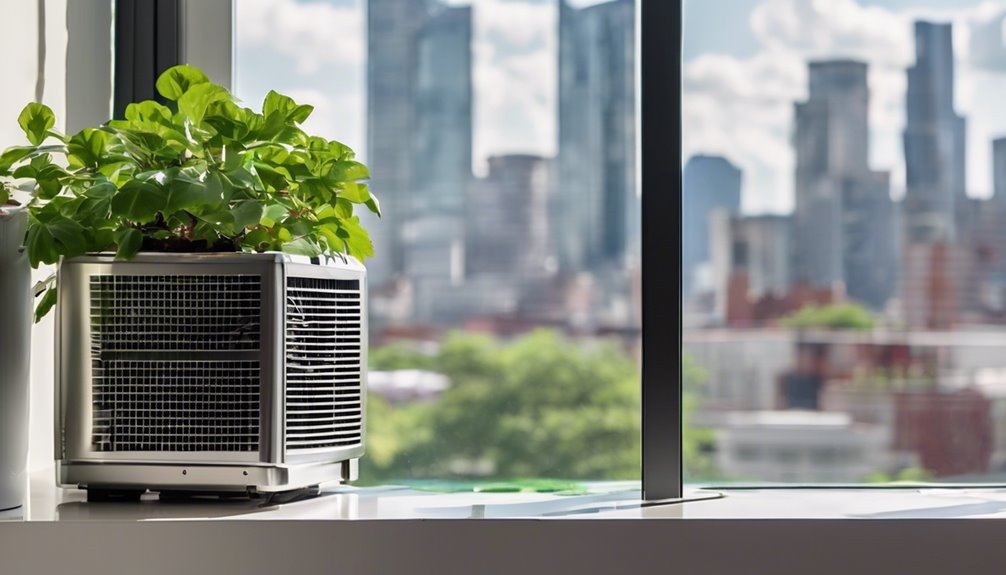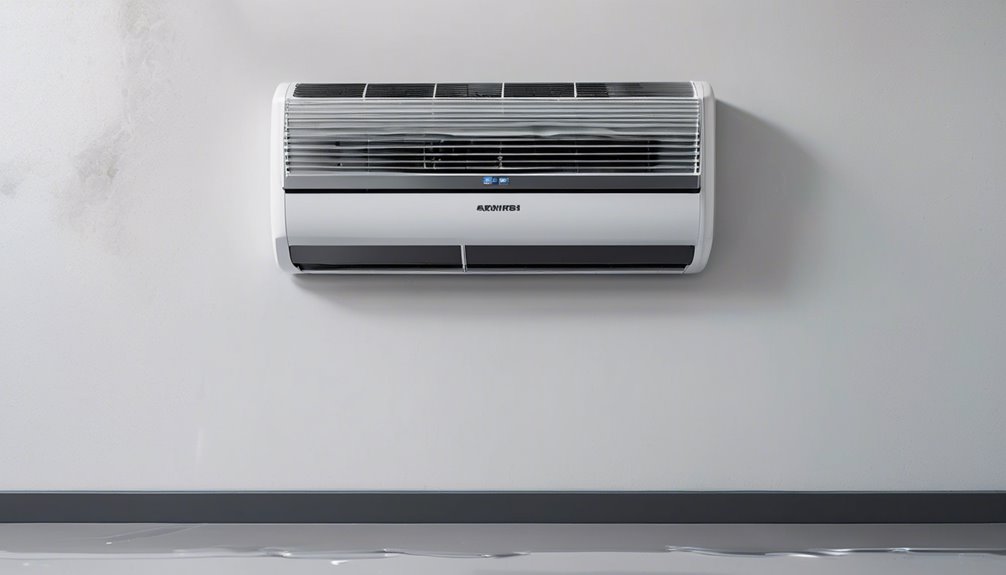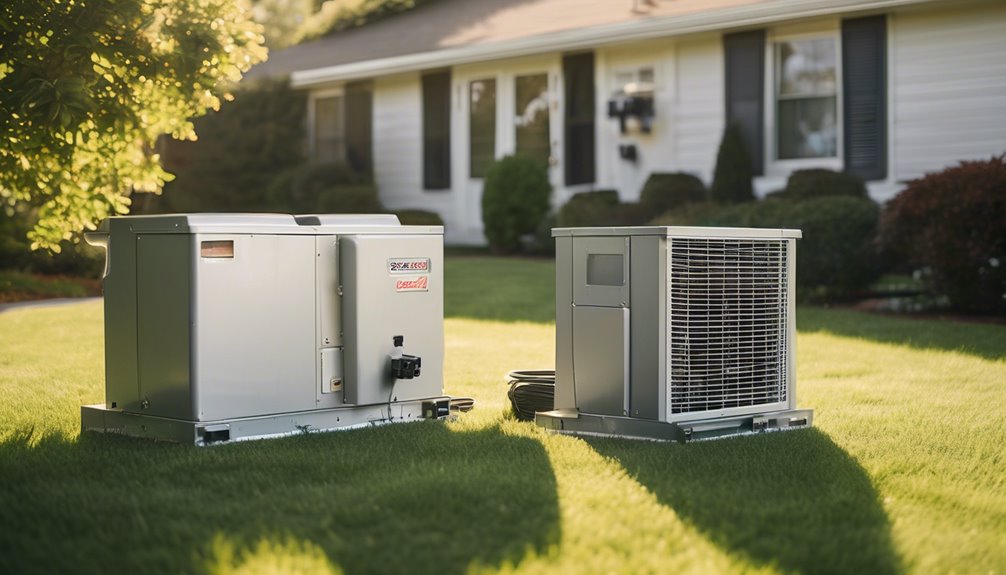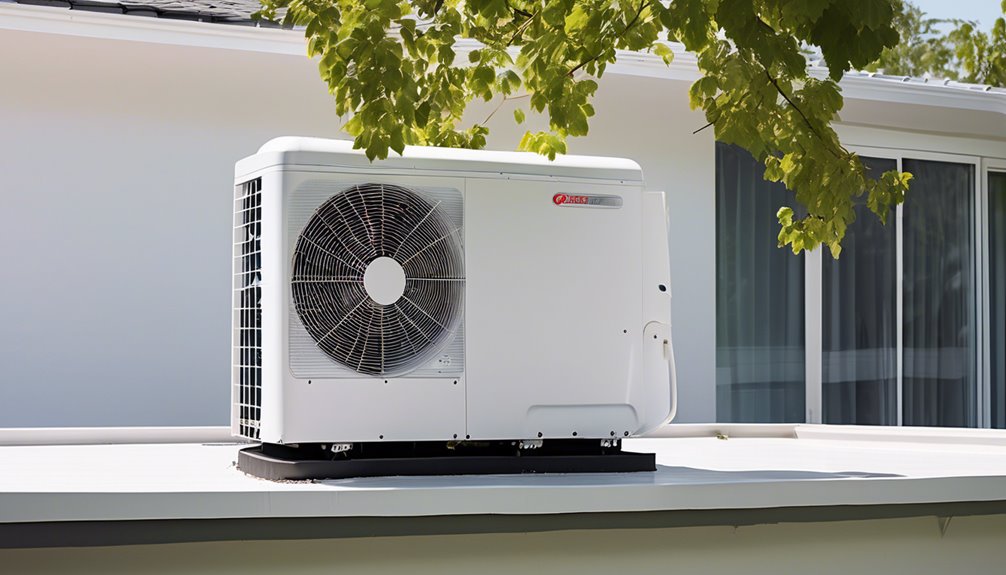To improve your AC's cooling performance, start by cleaning or replacing dirty air filters, ensuring proper airflow, and insulating and sealing ducts. Upgrading to a smart thermostat can also make a big difference. Additionally, regular maintenance of the condenser coils is crucial. By following these simple steps, you can increase your AC's efficiency and save up to 40% on your energy bills. Want to learn more about how to get your AC running like new again?
Key Takeaways
- Clean or replace air filters regularly to improve AC performance, air quality, and reduce energy bills.
- Ensure proper airflow by keeping furniture away, using fans, and minimizing clutter to optimize cooling.
- Insulate and seal ducts to prevent cooled air from escaping and reduce energy loss.
- Upgrade to a smart thermostat for remote access, scheduling, and energy usage tracking to optimize energy usage.
- Maintain condenser coils by cleaning every 1-2 months to improve AC performance and reduce energy bills.
Clean or Replace Air Filters
Dirty or clogged air filters can significantly reduce your air conditioner's cooling performance, leading to increased energy bills and potentially even system breakdowns.
You can prevent this by ensuring you have a high-quality filter installed. The type of filter you choose matters, too. Look for one with a high MERV rating, which measures filter quality.
A higher rating indicates a more efficient filter that captures smaller particles, resulting in better air quality and improved AC performance. Regularly cleaning or replacing your filter can make a big difference in your AC's cooling ability.
Ensure Proper Airflow
Proper airflow is essential for your air conditioner to operate efficiently and effectively. You can achieve this by ensuring that your AC unit has enough clearance from walls and obstacles. This Ventilation Boost will allow for better air circulation, which in turn will improve cooling performance.
| Tips | Benefits | Actions |
|---|---|---|
| Keep furniture away | Reduces airflow restriction | Rearrange furniture 3-4 feet away |
| Use fans | Enhances air circulation | Place fans to circulate cooled air |
| Upgrade to a high-flow AC | Increases air circulation | Consider replacing with a high-flow model |
| Minimize clutter | Reduces airflow obstruction | Regularly clean and declutter the room |
| Open windows (slightly) | Allows fresh air to enter | Open windows 1-2 inches for Air Circulation Optimization |
Insulate and Seal Ducts
About 20% of cooled air can escape through unsealed and uninsulated ducts, resulting in reduced cooling performance and increased energy bills.
You can prevent this by insulating and sealing your ducts. Start by inspecting your ducts for any gaps or cracks and seal them with a duct sealant.
Next, consider duct wrapping to reduce heat gain during the summer. Make sure your ducts are the right size for your AC unit; improper duct sizing can lead to reduced airflow and decreased efficiency.
Upgrade to a Smart Thermostat
You can take your AC cooling to the next level by upgrading to a smart thermostat, which offers a range of benefits that traditional thermostats can't match. With a smart thermostat, you can control the temperature remotely, schedule cooling sessions, and receive energy usage reports. These smart features help you optimize your cooling system, leading to significant energy savings.
| Feature | Description | Benefit |
|---|---|---|
| Remote Access | Control temperature from anywhere | Convenience |
| Scheduling | Set cooling sessions in advance | Energy Savings |
| Energy Reports | Track energy usage and costs | Informed Decision-making |
| Geofencing | Automatic temperature adjustment | Energy Efficiency |
| Alerts | Receive notifications for maintenance and issues | Improved System Reliability |
Maintain the Condenser Coils
Dirty condenser coils can silently sabotage your AC's cooling performance, driving up energy bills and reducing the system's lifespan.
Dirty condenser coils can silently sabotage your AC's cooling performance, increasing energy bills and reducing system lifespan.
To avoid this, you need to maintain your condenser coils regularly. You can do this by investing in coil cleaning tools, such as a garden hose or a specialized coil cleaning brush.
It's essential to create a coil cleaning schedule to ensure you don't forget. Here's a suggested schedule:
- Clean your condenser coils every 1-2 months during peak summer season.
- Inspect your coils every 2-3 months to check for debris buildup.
- Perform a deep clean of your coils every 6 months to remove stubborn dirt and grime.
Check Refrigerant Leaks
You'll want to identify any hidden refrigerant leaks, as they can significantly reduce your AC's cooling performance.
To do this, you'll need to detect the leaks, which can be a challenge, especially if they're small or in hard-to-reach areas.
Detecting Hidden Leaks
Refrigerant leaks can be detrimental to your air conditioner's performance and the environment.
To detect hidden leaks, you'll need to use specialized equipment and techniques.
You can use leak detection methods like ultrasonic leak detectors, halogen leak detectors, or fluorescent dye leak detectors.
These methods can help you identify the source of the leak.
Before starting the detection process, make sure to:
- Turn off the power to the AC unit.
- Allow the system to recover for at least 30 minutes.
- Perform pressure test procedures to ensure the system is stable.
Fixing Leak Sources
Once you've identified the source of the leak, it's time to fix it.
You'll need to gather the necessary leak repair tools to get started. This may include a vacuum pump, leak detector, and refrigerant recovery unit.
Depending on the type of leak, you may need to repair or replace components like valves, seals, or hoses. Make sure to follow proper safety protocols when working with refrigerants.
If you're not comfortable with the repair, consider hiring a professional. Remember, fixing the leak is only half the battle – you'll also need to recharge the system with the correct amount of refrigerant to ensure optimal AC performance.
Consider Professional Maintenance
You can ensure your AC runs efficiently by considering professional maintenance, which includes regular filter cleaning to improve airflow and reduce energy consumption.
Additionally, an expert system inspection can identify potential issues before they become major problems.
Regular Filter Cleaning
Dirty air filters can significantly reduce your air conditioner's cooling capacity, making it work harder and increasing your energy bills.
Regular filter cleaning is essential to maintain your AC's performance and filter efficiency. You can clean your filters every 1-2 months, depending on usage and filter quality.
- Improved airflow: Clean filters allow for better airflow, which means your AC can cool your space more efficiently.
- Increased filter lifespan: Cleaning your filters regularly can extend their lifespan, saving you money on replacement costs.
- Reduced energy consumption: By reducing the workload on your AC, clean filters can help lower your energy bills.
Expert System Inspection
How can you be sure your AC is running at its best? One way is to consider professional maintenance through an expert system inspection.
This comprehensive system assessment will identify potential issues before they become major problems. An expert evaluation will pinpoint areas of inefficiency, allowing for targeted improvements to boost cooling performance.
Don't risk a breakdown on the hottest day of the year – schedule an inspection to ensure your AC is running smoothly and efficiently. A professional technician will review your system, checking for refrigerant leaks, faulty thermostats, and other common issues.
With their expert evaluation, you'll get a detailed report outlining necessary repairs and recommendations for optimal system performance.
Frequently Asked Questions
Can I Use a Dehumidifier to Improve AC Cooling?
You can definitely use a dehumidifier to improve AC cooling by reducing humidity levels, which makes your AC work more efficiently. Ideal humidity levels are between 30-50%, and a dehumidifier's benefits include removing excess moisture, making your space feel cooler.
Will a Programmable Thermostat Save Me Money?
You'll save money with a programmable thermostat by avoiding energy waste from temperature fluctuations when you're not home or sleeping; it optimizes your AC's performance, reducing energy consumption and your utility bills.
How Often Should I Clean My AC Condenser Coils?
You should clean your AC condenser coils at least twice a year, during seasonal cleaning, to ensure optimal performance. Proper coil maintenance is key, so mark your calendar to remove dirt and debris that can hinder airflow.
Can I Install a Smart Thermostat Myself?
When considering DIY thermostat installation, you'll face challenges that require electrical expertise, so it's crucial you're comfortable with wiring and circuitry; if not, it's best to hire a pro to ensure a safe and proper install.
Do AC Tune-Ups Really Make a Difference?
You're wondering if AC tune-ups really make a difference. They do! A professional tune-up includes an energy audit to identify efficiency gaps, ensuring your AC operates at its optimal cooling capacity, saving you energy and money in the long run.
Conclusion
You've taken the first step to improving your AC's cooling performance by reading this article. Now, it's time to put these tips into action. By cleaning or replacing air filters, ensuring proper airflow, insulating and sealing ducts, upgrading to a smart thermostat, maintaining condenser coils, and checking for refrigerant leaks, you'll be well on your way to a cooler, more comfortable home. Don't forget to consider professional maintenance to ensure your system runs at its best.



